Interview with Former Dean Evan Caminker of University of Michigan Law School
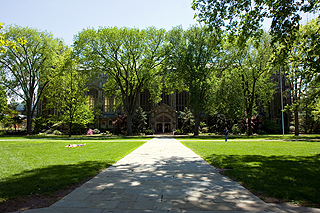 Published June 2009, last updated July 2009
Published June 2009, last updated July 2009
TLS: Since you’ve become Dean of Michigan Law, have there been any changes or developments within the school that you are particularly proud of?
I’m very excited and proud of several different things. First is the tremendous growth and development of both our faculty and academic programming. We’ve done a lot of faculty hiring: this year alone, we’ve hired seven new tenured or tenure-track faculty members and I think they’re bringing new energy and great strengths to the law school.
I’m also very excited about the way in which we have expanded and improved the offerings for students who are interested in developing their professional skills. Michigan has always been very highly evaluated and ranked by law firms and other legal employers for producing graduates who are very capable from the beginning of hitting the ground running and having the practical skills — as well as the theoretical and doctrinal knowledge — to become contributing members of the bar, but we’ve really focused on that during my deanship.
Since I’ve become dean, for example, we’ve increased the number of spots in our clinical legal education by 50%. Last year alone, we added four new really interesting clinics, including an international transactions clinic — the only one of its kind in the country — that focuses on cross-border legal transactions and marries an interest in business, transactional law, and international law. There’s also an innocence defense clinic, which represents individuals that we think have been wrongly convicted of crimes for which there is no DNA-evidence that supports that, unlike other law school clinics that currently exist. Next year, we’re starting a new human rights clinic focusing on human trafficking. So we’re really beefing up the legal practice slash experiential slash clinical aspect of the law school.
We are about to break ground on a very exciting and historic new building project that has a couple of different components — both of which are designed to really bolster what I think are strengths and emerging themes of the law school. It’s designed to create new interactive and informal student space where students can gather and hang out with each other, but also with faculty, and also to provide a better home for the experiential learning component of the law school.
Finally, we just completed a record-breaking fundraising campaign for the law school, and even in difficult times, we raised over $140 million that will go to faculty support, student support, and, of course, seed money for the new building.
TLS: Do you have any goals for the law school to achieve in the next five or ten years — either big-picture or minor?
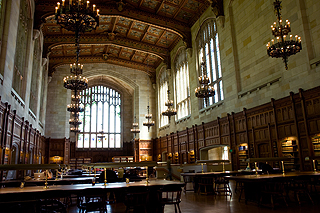 Let me focus on a few things, in addition to completing the major building campaign. First is to create more opportunities for international engagement. We have a tremendous faculty with respect to international law, including area experts in Japan, in China, in India, and the European Union. We have some really exciting externship programs, one that’s been around for quite some time in South Africa, and one in Cambodia — those are both human rights-oriented. And, over the last couple years we’ve opened up a new externship program in Geneva for people more interested in international law and policy. I want to continue seeing how we can push the horizon there and explore different ways of getting more students, as well as more faculty, engaged in cross-border issues.
Let me focus on a few things, in addition to completing the major building campaign. First is to create more opportunities for international engagement. We have a tremendous faculty with respect to international law, including area experts in Japan, in China, in India, and the European Union. We have some really exciting externship programs, one that’s been around for quite some time in South Africa, and one in Cambodia — those are both human rights-oriented. And, over the last couple years we’ve opened up a new externship program in Geneva for people more interested in international law and policy. I want to continue seeing how we can push the horizon there and explore different ways of getting more students, as well as more faculty, engaged in cross-border issues.
I want to continue honing our focus on the components of legal education that are preparing the practitioner of the future. So again, building on our strengths and having a fantastic legal skills program, legal practice program and clinical practice areas.
Just today we are announcing the hiring of a new professor from practice who is an alumnus named Bob Hirshon, a former president of the American Bar Association. One of his main roles will be to be a liaison between the law school and the legal profession and understand how changes in the legal profession are going to require changes in the curriculum here. He’ll help to make sure that we stay at the forefront of anticipating what are the kind of skills that we need to train our students with so they can continue to hit the ground running — even as the legal environment changes around us. He’ll be doing two things. He will be a professor from practice — he’ll be teaching classes related to legal ethics as well as the legal profession. But he will also play this other role working with career services and also with our alumni relations office in connecting current students with current practitioners.
Finally, I want to continue to build our commitment to pro bono and public interest law. As one of the finest public universities in the world, obviously public interest is part of our core mission. And we’ve done a number of things to bolster that over the short-run, but I want to continue building on that in the long-run. I don’t want to just rely on the conventional model of having lots of students spend lots of time in our backyard working on local legal services organizations — I want to develop more of a national pro bono slash public interest network where we can really integrate students into cutting edge areas of pro bono practice.
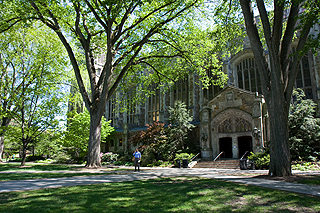 TLS: What one thing would you change about Michigan Law, besides its location? Are there any steps being taken to achieve this?
TLS: What one thing would you change about Michigan Law, besides its location? Are there any steps being taken to achieve this?
So here, I want to challenge the premise. I know you said the location in jest, but I wouldn’t change the location of Ann Arbor for the world, and I want to explain why. First of all, this is not a sleepy, Midwestern town. Ann Arbor is world famous in part because it’s highly intellectual, it’s intellectually vibrant, it’s culturally rich, and it’s a wonderful town to live in. People who have spent time here all uniformly say that.
Schools that are in big cities inevitably have a lot of the energy sort of dissipated or sucked out of them. A lot of faculty in big city law schools have other places to be at all times — they may be Of Counsel to law firms or other organizations, they have reasons not to be in the law school, and there are commuting issues that make it easier not to be in the law school except right around the time that they’re teaching. The same is actually true for students — a lot of students at big city law schools have reasons not to be at the law school. Law schools in big cities don’t necessarily reflect a lot of energy.
The energy and intensity here is actually incredible, and the community here is incredible. One of the hallmarks of Michigan Law — what makes it distinct from other law schools — is a very community-oriented, collaborative student body that enjoys each other, that enjoys working with the faculty. Part of it is that this is really the perfect-sized town in which to be educated. There’s a lot going on, so you can have a lot of fun, but the law school is still a focal point for people’s activities.
There are lots of things that help create this very communal, collegial environment, and being in Ann Arbor is one of them.
TLS: Are there any areas where you’re specifically looking to hire more faculty or change/add curriculum?
There are certainly some areas where we have been developing an emerging strength — Environmental Law is one, I’d say Law and Economics is another one, Tax is a third. There are other areas where we have traditionally been extremely strong that we continue to try and add to. International Law is one, I’d say Law and Humanities and Law and Social Sciences, and the interdisciplinary programs in general.
But a lot of what we do when we hire, actually, is to look for the best people on the market. We think as a long-term strategy, hiring people every year who are the best available candidates in terms of their scholarship and their teaching potential, in the long-run is a very good way to build an incredibly strong faculty.
TLS: So even if you say “Okay, our Tax Law area is very strong right now,” if there’s a great Tax Law professor out there, you’ll hire him?
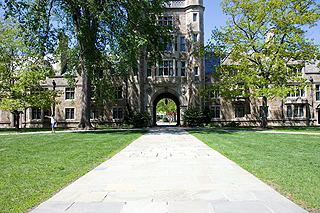 Absolutely. Because we just think, at the end of the day, we have the ability to be flexible enough in terms of how we teach classes and how we staff our curriculum so we can handle being large in an area if we have great strength. Intellectual Property is a good example of that. We’ve spent a lot of time and energy building our Intellectual Property cohort into what I think is a group that rivals the very best in the country.
Absolutely. Because we just think, at the end of the day, we have the ability to be flexible enough in terms of how we teach classes and how we staff our curriculum so we can handle being large in an area if we have great strength. Intellectual Property is a good example of that. We’ve spent a lot of time and energy building our Intellectual Property cohort into what I think is a group that rivals the very best in the country.
Beyond that we spend a lot of time thinking: What are the needs of our students? I mentioned this international transactions clinic — that idea was born by the fact that we looked and thought: we really would like to be providing more of a clinical experience that is directed toward international practice. Much of what that clinic does is actually focused on human rights. Much of what they do is facilitate microfinance lending to developing countries — to poor farmers and poor workers who need loans to develop themselves and their countries. So in one fell swoop we’re able to address the needs of people who want to do business work, who want to do international work, and who want to be focused on human rights.
TLS: The argument has been made that Michigan students have a better chance of landing a job in New York City firm than an NYU student, for example, since firms like to diversify the educational backgrounds of their new hires and Michigan students would have less of their peers to compete against. But some data and rankings place Columbia and NYU higher than Michigan for placing students at elite law firms. Is there evidence that your argument holds up?
Let me be clear about my claim: it is that for Michigan Law students who are interested in the elite Biglaw firms in the major markets, they do have a special advantage because of Michigan Law’s national reach.
Michigan law has a fantastic reputation in every major city in the country precisely because for many many years, we have sent our graduates to every major city in the country. Every major firm has partners from Michigan — often hiring partners, sometimes managing partners — and the demand for Michigan students at all the top law firms around the country is quite high.
On the other hand, because Michigan students spread themselves out around the whole country when they graduate, the supply of new graduates to any one city is not overwhelming. If the demand for Michigan students is high, and if there are fewer Michigan students every year going to apply for those jobs, then clearly any individual student here is competing against a smaller pool of classmates for those particular plum jobs.
How do I know this is true? Because this is the story that’s told to me again and again every time I talk to hiring partners at major law firms, whether they’re Michigan Law alumni or not. They basically explain what the hiring practices look like; they explain the built-in structural reasons why major law firms want to have among their new associates representatives from all the top law schools.
Now, if a survey simply counts how many graduates from which schools land in the elite Biglaw firms in major cities, it may well be that Michigan’s not number one on that list, and I’m very proud of that. Why am I proud of that? It’s because what that simply means is that there are many more Michigan graduates who choose a more diverse setting of job experiences.
We are very happy that every year we send a lot more students than those schools into public interest jobs, into government jobs, into teaching jobs, into business, into PhD programs, into clerkships. Some of our students choose to go to the best law firms in what you might call secondary cities — Seattle, Denver, Dallas, Atlanta, which might not be reflected in some of these surveys. We may well have fewer aggregate numbers of students, if you just look at the top New York or D.C. or San Francisco law firms, but that is a good thing about the school, and it is still consistent with the fact that if you come to Michigan and you choose to go into those law firms, you have a smoother path.
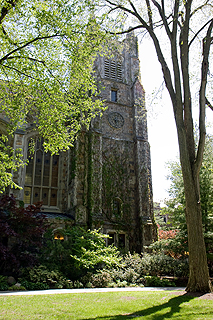 TLS: A few students have mentioned that if there’s a legal topic that a cohort of students is interested in, new classes have indeed been implemented by the school in response. How does this process work, in terms of student requests being developed into new curriculum? How quickly can a new class be implemented? Do you have any examples?
TLS: A few students have mentioned that if there’s a legal topic that a cohort of students is interested in, new classes have indeed been implemented by the school in response. How does this process work, in terms of student requests being developed into new curriculum? How quickly can a new class be implemented? Do you have any examples?
Sure, I just actually mentioned two: one is the international transactions clinic, a second is the human trafficking clinic that we’re just starting.
Both of them were designed in partial response to students saying, “Hey, it’d be nice if we had more opportunities like this.”
They get voiced in various ways. Sometimes I have students who come meet with me personally, usually as a delegate of interested students. We also have opportunities through normal, student representation on a variety of faculty committees, including a curriculum committee for students to have input into the curriculum and suggest ways in which it should be reshaped or expanded. We sit and we figure out how best to respond, and sometimes that can be quite quick.
TLS: How is the law school adapting to the changing legal market? Will there be any changes to the OCI process or career services?
We recognize it’s a new and challenging environment, and we certainly are working aggressively to mitigate the negative consequences.
We have six full-time counselors already available to work with our students on a one-on-one basis. They put together a whole host of seminars and materials and events with outside speakers designed to educate our students as best as possible about how they can strategically navigate both the OCI process specifically but just more generally, their own career choices.
We have in motion and are currently planning a number of new initiatives that will continue to link our students with our alumni in order to leverage the incredible talent and loyalty we have among our alumni base, who want to help our students.
Part of what we need to do is continue to educate students that they need to do the best job they can of educating themselves about the process before they go through — meaning, to really think carefully about what they want out of a career.
TLS: Do you think that given the downturn, students can no longer just rely on OCI to get a job?
I’ve always thought that it makes sense for students to think carefully about whether OCI has all the opportunities that they want to see, and that’s notwithstanding the fact that for many years I believe Michigan has had more employers — or at least, as many employers — coming here as any other law school in the country. We have a vast array of opportunities, and yet I would like to think that every student would sit down and say, “Is there something that actually interested me in a class that I had in my first year that is different than the path everyone else is taking?”
But yes, this year more than ever I do think people need to be introspective and strategic. This is a good year for folks who’ve always dreamed of being a public defender to actually try and make that a reality, for example.
We will continue to do things beyond either expanding OCI or supplementing OCI in terms of making sure there are alternative routes to bringing prospective employers to campus or helping our students connect to employers that are not coming to campus. We’ll be pulling out all the stops.
TLS: Many students view Michigan’s GPA-blind OCI bid process favorably, but a few students have remarked that its negatives (in their words: students “squandering” too many of their bids on unrealistic employment options and employers getting “miffed that they have to waste their time” with students who have far from the academic credentials necessary to be hired) might outweigh its benefits. How, in your view, does Michigan’s system for interview bids contribute positively to the entire interview process, and are there any ways to mitigate the stated negatives?
I actually do think that having a grade-blind bid process is a tremendous advantage for Michigan over any school that does the contrary. At the end of the day, the person you want making the decision about which firm will interview which student is the student. This is the best way to make sure that that happens.
Of course we want to continue doing the best job we can of educating students about what expectations different firms might have, so that students can do the best job of matching their own choices about who they should interview with, with firms in which they have a realistic chance of gaining employment.
On the whole, it seems to me and evidence tells us the system works extremely well — much better than any alternative.
TLS: What effects, positive and negative, do the U.S. News and World Report rankings have on law school culture and ultimately the legal profession as a whole?
I think the effort to produce comparable, quantitative, transparent data is well-intentioned, and I also think it’s clearly flawed. Some of the variables that get a lot of weight — for example, how much money is spent per student — don’t necessarily have any relationship to the quality of a student’s educational experience. Money spent on doilies for the faculty lounge get the same weight as money spent on faculty for student educational experiences.
Other variables that should be quite important — for example, how law firms and other employers rate the professional skills of a school’s graduates, something that Michigan ranks incredible highly on — don’t get any weight at all, beyond just bar passage rates which are far too crude to really reflect qualitative differences, particularly among the top law schools. In the effort to find easily comparable and quantifiable data, rankings inevitably look for information that may not really be the information you want to know.
There’s no question that the rankings and the extent to which students rely on those rankings create incentives for schools to make short-term decisions about their pedagogic mission in ways designed to improve their short-term rankings rather than make long-term investments into lasting greatness.
I guess my bottom-line is, I think the rankings have some place if they’re one of twenty bits of information that students might look at — that would be fine. But to the extent that they’ve come to dominate the landscape; I think that’s highly problematic.
No set of rankings — and certainly not any that I’ve seen before — can truly capture the spirit and quality of individual institutions and I think they, unfortunately, discourage students from truly investigating which schools really provide them with the best educational experience and the best professional maturation experience.
TLS: There’s lot of talk about Michigan being super collegial and friendly, but lots of law schools tout that about themselves. How is Michigan any different?
You’re right that every school wants to say that they have a collaborative, community-orientation among their students. There are still vast differences in fact. I have no doubt that Michigan is at the leading edge of community-oriented student bodies.
One way we know that is because every student body among the top schools has some transfer students from other schools. We have some students who are perfectly happy at Michigan but they get married to somebody and for a year have to go spend time on the West Coast or East Coast. We also have people who’ve been educated for the first two years at a school on the one of the coasts who come to Michigan for their last year. We know from student experiences how they compare our environment with other environments and that’s why I’m confident in being able to say that we really have a special student community here.
I think there are lots of causes for it. I think these historic buildings that comprise the law quad are a piece of it, frankly. People go to law school here in a very inspiring set of gothic buildings. Two thirds of the first year class live in the residence halls that are attached to the quad and therefore already feel like they’re part of the family.
Some of it is the point I made earlier, that there’s always a vitality and energy around the law quad because so many students live within walking and biking distance from the school. So, they feel connected to it, as compared to living in a sprawling metropolitan area where students may have long commutes to school and again, go in and come out after classes and don’t really feel a connection to it at other times.
I think it also matters that people don’t really view themselves as in competition with every one of their classmates for a set of jobs down the street, because you know that you and your classmates are going to be looking for a wide variety of different kinds of jobs in different places — you don’t always feel that everybody in your study group is going to be applying for exactly the same job at exactly the same set of five different New York or D.C. or San Francisco law firms in two years. There are all sorts of ways in which our students look out for or take care of each other. You can just see it in the way we operate, and that’s what’s really wonderful to see.
Interview with Edward Tom, Former Dean of Admissions U.C. Berkeley Boalt Hall School
Interview with Richard Geiger, Former Associate Dean and Dean of Admissions for Cornell Law School
Interview with Former Dean David E. Van Zandt of Northwestern University School of Law
Interview with Former Dean Robert Berring of Boalt Hall
Interview with Former Dean Sarah Zearfoss University of Michigan Law School
Interview with Professor Brian Leiter
Interview with Former Dean Victoria Ortiz UC Irvine School of Law
Interview with Former Dean Donald Polden of Santa Clara
Interview with Former Dean Jeanette Leach of Admissions to Santa Clara University's School of Law
Interview with Santa Clara Law School Former Assistant Dean Alexandra Horne
Interview with Former Dean Hasl of Thomas Jefferson School of Law
Interview with Joan Howland, Former Associate Dean at the University of Minnesota
Interview with Former Dean Evan Caminker of University of Michigan Law School
Interview with Former Dean Erwin Chemerinsky UC Irvine School of Law
Interview with Former Dean Jason Trujillo of UVA Law
Interview with Former Dean Stewart Schwab of Cornell Law School
Interview with Ann Perry of The University of Chicago Law School
Interview with Johann Lee at Northwestern University Law School
Interview with Kevin Johnson UC Davis Law
Interview with Former Dean Robert Rasmussen of USC Law
Interview with Dr. Karen Reagan Britton, UT Law
Interview with Dean Doug Blaze, UT Law
Interview with Jannell Roberts, Former Associate Dean of Admissions at Loyola Law
Interview with Susan L. Krinsky, Former Associate Dean of Admissions at Tulane Law
Interview with Faye Shealy, Former Associate Dean of Admissions at William & Mary Law School
Interview with Robert H. Jerry, II, Former Dean & Levin Mabie and Levin Professor of Law
Interview with Former Dean Earl Martin of Gonzaga Law
Interview with Stephen Brown, Associate Dean of Admissions at the Fordham University School of Law
Interview with Jacqlene Nance, Former Director of Admissions at the University of Kansas School of Law
Interview with Former Dean Robert Schwartz at UCLA School of Law
Interview with Matthew Diller, Former Dean and Professor of Law at Benjamin N. Cardozo School of Law
Interview with Andy Cornblatt, Dean of Admissions at Georgetown University Law Center (GULC)
Interview with Chris Guthrie, Dean of the Vanderbilt University Law School
Interview with G. Todd Morton, Assistant Dean and Dean of Admissions for Vanderbilt University Law School
Interview with Susan Lee, Former Director of Admissions at Gonzaga University School of Law
Interview with Arizona State University Sandra Day O’Connor College of Law Former Dean and Foundation Professor of Law – Paul Schiff Berman
Interview with Alissa Leonard, Director of Admissions and Financial Aid at the Boston University School of Law
Interview with David Partlett, Former Dean of Emory University School of Law
Interview with Michelle Rahman, Former Associate Dean for Admissions at the University of Richmond School of Law
Interview with Isabel DiSciullo, Former Assistant Dean of Admissions for Drexel Law
Published July 2010 Introduction Top-Law-Schools.com would like to thank Asha Rangappa, Associate Dean for Admissions at Yale Law School, for taking the time to answer our questions! TLS: Since becoming Associate Dean in 2007, you have reached out to th
Interview with Josh Rubenstein, Former Assistant Dean for Admissions at Harvard Law School
Interview with Renee C. Post at the University of Pennsylvania School of Law
Interview with Former Dean Rita C. Jones of Boston College Law School
Interview with S. Brett Twitty, Former Director of Admissions, W&L Law
Interview with Lillie V. Wiley-Upshaw, Vice Dean for Admissions and Financial Aid, University at Buffalo Law School
Interview with Nikki Laubenstein, Director of Admissions at Syracuse University College of Law
Interview with Janet Laybold, Former Associate Dean, Admissions, Career and Student Services, Washington University School of Law
Interview with Anthony Crowell, Former Dean of New York Law School
Interview with Jessica Berg and Michael Scharf, Former Co-Deans of Case Western Reserve University School of Law
Interview with Alyson Suter Alber, Associate Dean for Enrollment Planning and Strategic Initiatives, Case Western Reserve University School of Law
Interview with Jeffrey A. Dodge, Former Associate Dean of Students, Academic Affairs & Administration, University of Idaho College of Law
Interview with L. Pilar Mensah, Assistant Dean for Admissions; Sondra R. Tennessee, Associate Dean for Student Affairs; and Tiffany J. Tucker, Assistant Dean for Career Development, University of Houston Law Center
Interview with Jay L. Austin, Former Assistant Dean, Admissions and Student Financial Services, UC Irvine School of Law
Interview with Mathiew Le, Former Assistant Dean of Admissions & Financial Aid, University of Washington School of Law
Interview with Daniel M. Filler, Dean and Professor of Law, Drexel University, Thomas R. Kline School of Law
Interview with Donald Tobin, Dean and Professor of Law, the University of Maryland Francis King Carey School of Law
Interview with Amy Mangione, Assistant Dean and Director of Admissions, Albany Law School
Interview with Christopher J. Peters, Former Dean and Professor of Law, The University of Akron School of Law
Interview with Carla Pratt, Dean and Professor of Law, Washburn University School of Law
Interview with Michelle Rahman, Associate Dean for Admissions, the University of Richmond School of Law
Interview with Verna Williams, Interim Dean and Nippert Professor of Law, the University of Cincinnati College of Law
Interview with Allen Rostron, Former Associate Dean for Students and the William R. Jacques Constitutional Law Scholar and Professor of Law, University of Missouri-Kansas City School of Law
Interview with Faye Shealy, Former Associate Dean for Admission, William & Mary Law School
